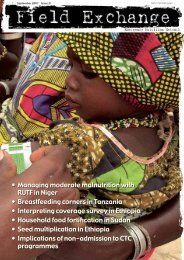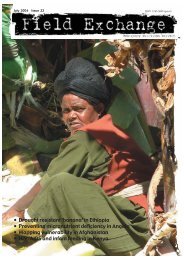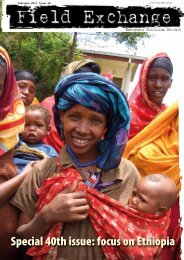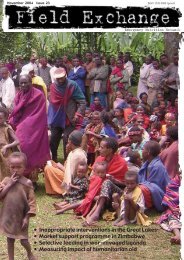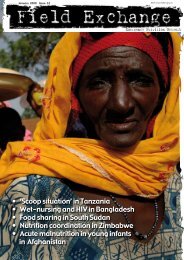Download a PDF of this issue - Field Exchange - Emergency ...
Download a PDF of this issue - Field Exchange - Emergency ...
Download a PDF of this issue - Field Exchange - Emergency ...
You also want an ePaper? Increase the reach of your titles
YUMPU automatically turns print PDFs into web optimized ePapers that Google loves.
<strong>Field</strong> Article<br />
Volunteer<br />
Health Workers<br />
and facilitators<br />
at Svisivi,<br />
Gokwe South<br />
Frontline<br />
experiences<br />
<strong>of</strong> Community<br />
Infant and<br />
Young Child<br />
Feeding in<br />
Zimbabwe<br />
By Wisdom G. Dube, Thokozile Ncube<br />
and Paul Musarurwa<br />
Wisdom G. Dube is the<br />
Gokwe North district nutritionist,<br />
Ministry <strong>of</strong> Health<br />
and Child Welfare (MOHCW),<br />
Zimbabwe.<br />
Thokozile Ncube is the<br />
UNICEF Nutrition Officer and<br />
one <strong>of</strong> the Master Trainers<br />
for community infant and<br />
young child feeding (cIYCF)<br />
trainings in Zimbabwe.<br />
Paul Musarurwa, is a district<br />
nutritionist for MOHCW in<br />
Goromonzi district. He took<br />
part in the cIYCF training in<br />
Gokwe North district as a<br />
facilitator and was a Team<br />
Leader in one <strong>of</strong> the training<br />
sites.<br />
The authors acknowledge the leadership <strong>of</strong><br />
the Ministry <strong>of</strong> Health and Child Welfare,<br />
Department <strong>of</strong> Nutrition, for championing<br />
expansion <strong>of</strong> IYCF services in Zimbabwe. We<br />
would like to specifically acknowledge the<br />
work and support <strong>of</strong> Mrs. Ancikaria<br />
Chigumira (Deputy Director <strong>of</strong> Nutrition),<br />
Zephania Gomora, Provincial Nutritionist for<br />
Manicaland and Miriam Banda, Nutrition<br />
Intervention Manager. The authors also<br />
gratefully acknowledge the work <strong>of</strong> Mary<br />
Lung’aho and Maryanne Stone Jimenez<br />
(master trainers) and the facilitators in the<br />
Gokwe North training (see table <strong>of</strong> names at<br />
the end <strong>of</strong> the article). Finally, many thanks<br />
goes to all the trained community IYCF<br />
counsellors for their taking part in the training<br />
and the Gokwe North district health<br />
executive team for their support during the<br />
training.<br />
UNICEF, Zimbabwe, 2011<br />
This article shares the perspective <strong>of</strong> three<br />
individuals in Zimbabwe, directly involved<br />
in rollout <strong>of</strong> community based support to<br />
infant and young child feeding (cIYCF). The<br />
content was captured in an exchange<br />
between the authors during training<br />
between 10-14th <strong>of</strong> October, 2011 in Gokwe<br />
North, one <strong>of</strong> the districts in Zimbabwe. A<br />
postscript by Fitsum Assefa (UNICEF<br />
Zimbabwe) provides some context to the<br />
cIYCF approach in Zimbabwe.<br />
Background to IYCF in Zimbabwe<br />
Undernutrition is widespread in Zimbabwe,<br />
with 1 in every 3 children being stunted. Despite<br />
subscribing to the Global Infant and Young<br />
Child Strategy 1 since 1991, being a ‘breastfeeding<br />
nation’ with 77% <strong>of</strong> infants breastfed at least<br />
until their first birthday (mean duration <strong>of</strong><br />
breastfeeding 18 months), and years <strong>of</strong> effort to<br />
expand infant and young child feeding (IYCF)<br />
interventions (e.g. BFHI 2 , training <strong>of</strong> health<br />
workers on IYCF, integration <strong>of</strong> IYCF in CMAM<br />
etc.), key IYCF practices in Zimbabwe remain<br />
very poor and unchanged.<br />
Only six per cent <strong>of</strong> Zimbabwean infants<br />
under the age <strong>of</strong> 6 months are exclusively breastfed.<br />
Nearly one in three children (27 per cent)<br />
receive s<strong>of</strong>t, semi-solid, or solid foods before the<br />
age <strong>of</strong> 3 months, and more than half (52 per cent)<br />
receive s<strong>of</strong>t, semi-solid, or solid foods before the<br />
age <strong>of</strong> 6 months 3 . Less than one in ten children (8<br />
per cent) receive a minimum acceptable diet,<br />
and very few regularly receive eggs, meat,<br />
legumes, or fruits and vegetables, owing to<br />
economic constraints but also strong food<br />
taboos. Seventy-five per cent <strong>of</strong> Zimbabwean<br />
infants are reported to initiate breastfeeding<br />
within one hour after birth, however, qualitative<br />
studies reveal widespread use <strong>of</strong> pre-lacteal<br />
feeds and discarding <strong>of</strong> colostrum (the first<br />
breastmilk produced after birth). Considering<br />
the evidence that support for optimal IYCF practices<br />
remains the highest impact intervention<br />
towards ensuring survival, growth and development<br />
<strong>of</strong> children, improving the IYCF practices<br />
<strong>of</strong> mothers, infants and young children remains<br />
one <strong>of</strong> the key priorities for Zimbabwe.<br />
Motivation behind community infant and<br />
young child feeding (cIYCF)<br />
innovation in Zimbabwe<br />
In Zimbabwe, the need to build the capacity <strong>of</strong><br />
Village Health Workers (VHWs) to support<br />
mothers and caregivers on optimal infant feeding<br />
practices and to refer <strong>issue</strong>s they cannot<br />
handle to the health institutions was apparent.<br />
Hundreds <strong>of</strong> health workers at different institutions<br />
in the country have been trained in IYCF<br />
counselling using the WHO 40 hour training<br />
manual since 1991. However, the impact <strong>of</strong> the<br />
training has not been felt, as evidenced by the<br />
low rates <strong>of</strong> exclusive breastfeeding in the country<br />
(32%) that has not changed over the past two<br />
decades (DHS 2011 4 ). When the UNICEF<br />
community IYCF counselling package was introduced<br />
in 2011 (see Box 1) , Zimbabwe had<br />
already identified the need and was ready to<br />
strengthen and scale up effective IYCF counselling<br />
in the community.<br />
We believe that the provision <strong>of</strong> skilled IYCF<br />
counselling services at community level, where<br />
trained VHWs have direct contact with mothers,<br />
their infants/children and broader families at<br />
large, can contribute significantly to improving<br />
IYCF practices and the reduction <strong>of</strong> chronic<br />
undernutrition. For many years, IYCF initiatives<br />
in Zimbabwe have concentrated on training<br />
health workers. This assumes IYCF counselling<br />
is mainly provided at health institutions.<br />
However in reality, health workers are very busy<br />
and do not have enough time to give adequate<br />
attention and time (especially considering the<br />
recent economic and social crisis that has<br />
resulted in severe understaffing <strong>of</strong> the health<br />
system). At a health facility, IYCF ‘talks’, given as<br />
part <strong>of</strong> health talks, are mostly limited to informing<br />
mothers <strong>of</strong> the benefits <strong>of</strong> breastfeeding<br />
rather than listening and counselling based on an<br />
individual mother’s condition. Such an approach<br />
only reaches those who are accessing health services<br />
because <strong>of</strong> scheduled services (e.g. antenatal<br />
care (ANC) and immunisation) or due to illness<br />
and does not reach those who are not able/have<br />
no need to access these services. In addition, such<br />
talks miss critical contact times to assess, counsel<br />
and influence IYCF practices in a proactive and<br />
sustained manner. It is also worth noting that<br />
while the social and cultural determinants <strong>of</strong><br />
IYCF are significant, the approach <strong>of</strong> health<br />
education at a facility focuses on the mother, who<br />
does not have the sole responsibility or control<br />
over deciding IYCF practices.<br />
While the role <strong>of</strong> VHWs in Zimbabwe<br />
includes communicating on all aspects <strong>of</strong> health,<br />
including nutrition, to date there has been very<br />
limited IYCF included in their training and job<br />
aids. Thus VHWs have not been enabled to<br />
provide an effective IYCF assessment and counselling<br />
service.<br />
cIYCF strategy<br />
The cIYCF strategy is to ensure that all mothers<br />
and caregivers <strong>of</strong> babies aged 0 to 24 months <strong>of</strong><br />
age in Zimbabwe have access to skilled IYCF<br />
assessment and counselling within the communities<br />
they live in. An individual VHW covers<br />
about 100 households and knows the population<br />
in his/her catchment and their various needs<br />
very well.<br />
Box 1: UNICEF Community IYCF Counselling Package<br />
UNICEF has developed a set <strong>of</strong> generic tools for programming<br />
and capacity development on community based IYCF<br />
counselling. Aimed for use in diverse country contexts, the<br />
package <strong>of</strong> tools guides local adaptation, design, planning<br />
and implementation <strong>of</strong> community based IYCF counselling<br />
and support services at scale. It also contains training tools<br />
to equip community workers, using an interactive and<br />
experiential adult learning approach, with relevant knowledge<br />
and skills on the recommended breastfeeding and<br />
complementary feeding practices for children from 0 up<br />
to 24 months, enhance their counselling, problem solving,<br />
negotiation and communication skills, and prepare them<br />
to effectively use the related counselling tools and job aids.<br />
The package contains:<br />
• Facilitator Guide<br />
• Planning and Adaptation Guide<br />
• Key Messages Booklet<br />
• Training Aids<br />
• How to breastfeed your baby - Brochure<br />
• Nutrition During Pregnancy and Breastfeeding -<br />
Brochure<br />
• How to feed a baby after six months - Brochure<br />
• Counselling Cards for Community Workers<br />
Participant materials<br />
It is available in English and French. <strong>Download</strong> from:<br />
http://www.unicef.org/nutrition/index_58362.html<br />
1<br />
A national commitment/cabinet decision for improving food<br />
and nutrition security in Zimbabwe and a response to the<br />
call by the Convention <strong>of</strong> the Right <strong>of</strong> the Child 1990, <strong>of</strong><br />
which Zimbabwe is signatory<br />
2<br />
Baby Friendly Hospital Initiative<br />
3<br />
Available from http://www.measuredhs.com<br />
4<br />
However, giving oil for infants is widely practiced in Zimbabwe,<br />
and survey conducted in 2010 that probed on giving oil has<br />
shown only 5.8% EBF, majorly explained by the addition <strong>of</strong><br />
oil in the analysis.<br />
5<br />
Available at http://www.unicef.org/nutrition/index_58362.html<br />
95



